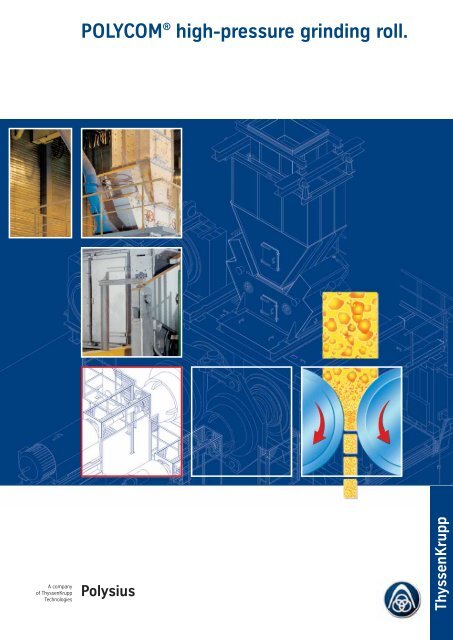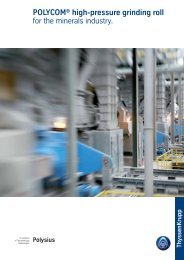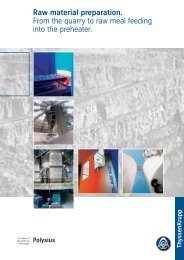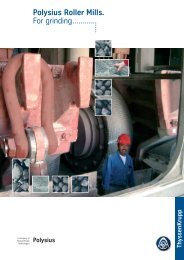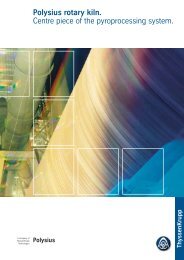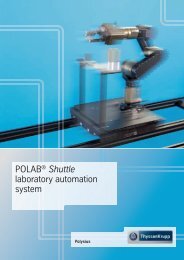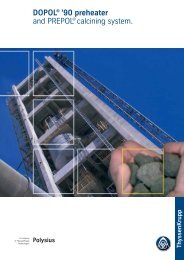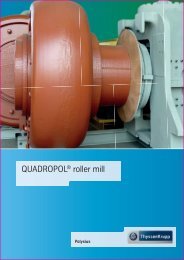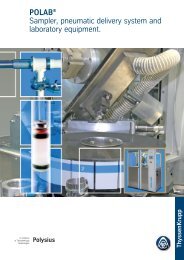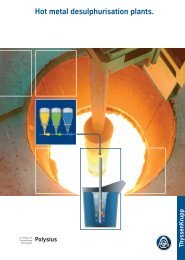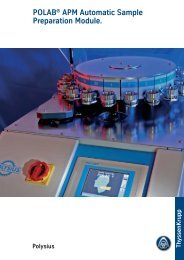POLYCOM® grinding rolls
POLYCOM® grinding rolls
POLYCOM® grinding rolls
Create successful ePaper yourself
Turn your PDF publications into a flip-book with our unique Google optimized e-Paper software.
POLYCOM ® high-pressure <strong>grinding</strong> roll.<br />
A company<br />
of ThyssenKrupp<br />
Technologies<br />
Polysius<br />
tk
POLYCOM ® high-pressure <strong>grinding</strong> roll.<br />
The proven energy-saving <strong>grinding</strong> system.<br />
One of the principal reasons for<br />
the outstanding success of the<br />
high-pressure <strong>grinding</strong> roll in<br />
the cement industry is its low<br />
power requirement. Today,<br />
this mill is employed all around<br />
the world for the <strong>grinding</strong> of<br />
cement raw material, cement<br />
clinker and granulated blast<br />
furnace slag.<br />
Since the POLYCOM ® was introducted by<br />
Polysius onto the market in 1985 more than 250<br />
units have been sold, so that almost half of the<br />
approximately 500 mills operating worldwide on<br />
the interparticle comminution principle bear the<br />
name POLYCOM ® and stand for »Made by<br />
Polysius«.<br />
POLYCOM ® for<br />
clinker <strong>grinding</strong> in a<br />
combi <strong>grinding</strong> system<br />
in Saudi Arabia.<br />
The popularity of this type of<br />
mill is due to the excellent<br />
operating results, the substantial<br />
reduction in energy consumption<br />
with resulting cost<br />
savings and the enormous<br />
throughput increases when<br />
incorporated into existing conventional<br />
<strong>grinding</strong> plants.<br />
Uneconomical plant components<br />
can then be shut down,<br />
slashing operating and maintenance<br />
expenses.<br />
POLYCOM ® units are designed<br />
for throughput rates of up to<br />
1,300 tph. The mill feed material<br />
can be dry or moist with<br />
a largest feed grain size of up<br />
to 60 mm.<br />
The POLYCOM ® can be used as<br />
a primary mill in combination<br />
with – for example – tube mills,<br />
as a component of combi<br />
<strong>grinding</strong> systems, or as an<br />
independent finishing mill.<br />
The larger the amount of <strong>grinding</strong><br />
work performed by the<br />
high-pressure <strong>grinding</strong> roll, the<br />
greater is the energy saving.<br />
Modern, user-friendly regulating,<br />
monitoring and control<br />
devices, combined with<br />
advanced process technology,<br />
ensure reliable and effective<br />
operation of the plant and an<br />
efficient process cycle.<br />
POLYCOM ® for<br />
cement finish <strong>grinding</strong><br />
in Belgium.
3<br />
POLYCOM ® for<br />
clinker <strong>grinding</strong> in a<br />
combi <strong>grinding</strong> system<br />
in the Lebanon.<br />
Comminution in the POLYCOM ® is<br />
based on the following principle:<br />
When a brittle particle of material<br />
is subjected to pressure between<br />
two <strong>grinding</strong> media, only that one<br />
particle is comminuted. However,<br />
when a particle is subjected to<br />
pressure between two other particles,<br />
all three particles are comminuted.<br />
And this involves very<br />
little relative movement between<br />
the <strong>grinding</strong> elements and the<br />
material being ground and<br />
between the particles in the layer<br />
of material.<br />
The outcome is that the POLYCOM ®<br />
needs less than half the energy<br />
consumed by, for instance, a tube<br />
mill.<br />
The <strong>grinding</strong> elements are two counter-rotating <strong>rolls</strong>, one fixed<br />
and the other floating, between which the material is crushed.<br />
The required comminution pressure is transmitted via the floating<br />
roll. This method of high-pressure<br />
interparticle comminution produces<br />
compacted cakes of material containing<br />
a high proportion of fines and<br />
coarser particles showing extensive<br />
cracking. Depending on the foreseen<br />
use of the product, the cakes can<br />
either simply be disagglomerated, or<br />
finish ground and fed to a separator.
4<br />
Innovative POLYCOM ® design.<br />
The guarantee for high availability and economical<br />
continuous operation.<br />
In order to meet the demands placed on interparticle comminution,<br />
such as<br />
x long service life of the roll surface,<br />
x energy-efficient production of the<br />
compacted cakes,<br />
x optimum material draw-in performance, in<br />
order to assure maximum throughput and<br />
x very smooth running, in order to protect<br />
the machine<br />
Drive system:<br />
planetary gear unit with<br />
electric motors (constant<br />
or variable speed).<br />
Material feed system.<br />
The hydraulic system<br />
includes the pressure application<br />
and spring systems with<br />
pressure cylinders and piston<br />
accumulators.<br />
the POLYCOM ® <strong>grinding</strong> <strong>rolls</strong><br />
have a length to diameter ratio<br />
of between 0.3 and 0.7.<br />
This provides the following<br />
advantages:<br />
x large shaft diameter for<br />
absorbing the bending and<br />
torsional stresses,<br />
x self-aligning roller bearings<br />
dimensioned for a safe and<br />
reliable operation,<br />
x optimum distance between<br />
bearings, minimising the<br />
bending moments,<br />
x thick roll bodies to ensure<br />
a safe shrink fit and<br />
x thick wearing layers<br />
on the roll surface for long<br />
operating times.<br />
The fixed and floating <strong>rolls</strong> are<br />
both mounted in bearing<br />
blocks. The self-aligning roller<br />
bearings, which compensate<br />
for tilting of the <strong>rolls</strong>, have a<br />
multiple seal system to prevent<br />
dust penetration and grease<br />
loss. The bearing blocks of the<br />
fixed roll are bolted onto the<br />
machine frame, while those of<br />
the floating <strong>rolls</strong> travel in a longitudinal<br />
slideway.<br />
of the <strong>grinding</strong> pressure in<br />
the roll gap and to protect the<br />
machine against possible overloading.<br />
The floating roll automatically<br />
accommodates changes in<br />
feed material characteristics by<br />
moving outwards or inwards.<br />
Spacers prevent the <strong>rolls</strong> from<br />
touching.<br />
The fixed and floating <strong>rolls</strong> are<br />
of identical construction and<br />
can therefore be interchanged.<br />
The material feed device is<br />
designed to ensure optimal<br />
mass flow. The feed bin is<br />
mounted on weigh cells for<br />
continuous measurement of<br />
the filling level.<br />
The walls of the vertical feed<br />
chute can be adjusted during<br />
operation, in order to adapt the<br />
POLYCOM ® throughput to the<br />
respective requirements.<br />
The <strong>grinding</strong> force is transmitted<br />
to the floating roll by<br />
4 hydraulic cylinders.<br />
A hydropneumatic spring system<br />
allows the setting of different<br />
pressure characteristics<br />
and different control methods<br />
to enable optimum application
Since the introduction of the POLYCOM ® , a continuous<br />
process of purposive wear protection<br />
advancement has taken place. With the development<br />
of<br />
x forged, hardfaced <strong>rolls</strong><br />
x chill cast alloy tyres made of bainite and<br />
x chill cast alloy tyres made of compound<br />
casting,<br />
Polysius has created a wear protection program<br />
that provides optimal and reliable solutions<br />
for the broadest possible range of requirements.<br />
While forged <strong>rolls</strong> with hard facing<br />
are used in all mill sizes as<br />
the favourably-priced standard<br />
solution for moderate wear<br />
conditions, chill cast alloy tyres<br />
made of compound casting or<br />
bainite ensure a long service<br />
life even when high comminution<br />
pressures are being<br />
applied.<br />
However, the use of chill cast<br />
alloy tyres is limited to certain<br />
machine sizes and operating<br />
conditions.<br />
The results of recent evaluations<br />
have proven the achievement<br />
of excellent service lives:<br />
One POLYCOM ® used for <strong>grinding</strong><br />
raw material with a high<br />
quartz content achieved a<br />
service life of 55,000 (!) operating<br />
hours without needing a<br />
change of its compound cast<br />
tyres. Bainite tyres, which were<br />
introduced onto the market at a<br />
They run and run<br />
and run ...<br />
Centrifugally produced<br />
compound<br />
cast tyres have<br />
already achieved<br />
operating times of<br />
over 55,000 hours.<br />
much later date, have already<br />
achieved preliminary (!) service<br />
life figures of over 40,000<br />
operating hours.<br />
The degree of reliability achieved<br />
today results in a drastic<br />
reduction in the amount of<br />
maintenance required by existing<br />
<strong>grinding</strong> plants and thus<br />
allows the efficiency of the<br />
POLYCOM ® to be fully exploited.<br />
To date, homogenous chilled<br />
casting <strong>rolls</strong> made of bainite<br />
have achieved operating<br />
times of 40,000 hours –<br />
already an outstanding<br />
attainment, but by no means<br />
the final value ...<br />
Forged <strong>rolls</strong> with<br />
hard facing are a<br />
favourably-priced<br />
solution for<br />
many types of feed<br />
material.<br />
The profiles welded onto the <strong>grinding</strong><br />
<strong>rolls</strong> maximise the feed material<br />
pull-in capability and minimise the<br />
relative movement between the<br />
material being ground and the roll<br />
surface.
6<br />
Application examples.<br />
For different process technological tasks,<br />
there are a number of possible system configurations,<br />
in which the process steps<br />
x material feeding,<br />
x comminution and<br />
x classification<br />
are combined. Additional process steps,<br />
such as<br />
x drying,<br />
x moistening,<br />
x disagglomeration and<br />
x storage<br />
can be incorporated into the process as<br />
required.<br />
Finish <strong>grinding</strong><br />
Use of the high-pressure<br />
<strong>grinding</strong> roll for finish <strong>grinding</strong><br />
achieves the greatest energy<br />
savings, which can be as<br />
high as 50%, compared with<br />
conventional tube mill systems.<br />
Feed material with up to 4%<br />
moisture content is dried in the<br />
separator. Material with higher<br />
moisture contents is dried in<br />
a separate unit, for instance a<br />
shaft-type flash dryer.<br />
Primary <strong>grinding</strong><br />
When the high-pressure <strong>grinding</strong><br />
roll is used as a primary mill, the throughput of<br />
existing <strong>grinding</strong> plants is increased by up to 40%<br />
and the energy requirement of the overall plant is<br />
reduced by up to 20%.<br />
Combi <strong>grinding</strong><br />
Used in combi <strong>grinding</strong> systems, the POLYCOM ®<br />
brings energy savings of up to 40% compared with<br />
conventional tube mill systems, as well as increasing<br />
the throughput of existing<br />
tube mill <strong>grinding</strong> plants by<br />
over 100%. As the product of<br />
the primary <strong>grinding</strong> circuit is<br />
separated material, the tube<br />
mills can be dimensioned smaller<br />
than usual if the combi <strong>grinding</strong><br />
system is a new installation.<br />
The material is dried in the tube<br />
mill. This system allows the<br />
incorporation of several tube<br />
mills and permits separate primary<br />
<strong>grinding</strong> of different components.<br />
The defined size of the<br />
feed material allows optimum<br />
grading of the ball charge.
Technical Data.<br />
7<br />
L2<br />
H<br />
Z<br />
X<br />
Y<br />
B<br />
L1<br />
Size<br />
Type<br />
Roll diameter<br />
Roll width<br />
Grinding force<br />
Drive power<br />
L1<br />
L2<br />
B<br />
H<br />
Y<br />
Z<br />
X<br />
mm<br />
mm<br />
kN<br />
kW<br />
mm<br />
mm<br />
mm<br />
mm<br />
mm<br />
mm<br />
mm<br />
1<br />
2 3 4 5 6 7 8 9 10<br />
10/3 10/4 12/4 12/5 13/5 13/6 14/6 14/7 15/7 15/8 16/8 16/9 17/10 17/11 19/11 19/12 20/12 20/13 22/13 22/15<br />
1,050 1,200 1,300 1,400 1,520 1,600 1,740 1,870 2,050 2,200<br />
380 460 460 520 520 600 600 660 660 760 760 900 1,000 1,100 1,100 1,200 1,200 1,300 1,300 1,500<br />
3,400 4,300 5,700 7,000 8,600 11,000 13,500 17,000 20,000 26,000<br />
300 450 560 900 1,100 1,450 1,650 1,900 2,500 3,400<br />
1,700 1,900 2,000 2,100 2,400 2,500 2,600 2,900 3,000 3,200<br />
3,145 3,600 3,795 4,270 4,750 4,965 5,615 6,130 6,460 7,500<br />
1,690 1,930 2,020 2,170 2,410 2,560 2,860 3,100 3,250 4,000<br />
1,685 1,845 1,955 2,095 2,295 2,565 2,755 3,160 3,160 3,700<br />
3,795 3,990 4,150 4,675 5,675 5,750 6,000 6,700 6,910 8,000<br />
6,280 6,640 6,700 7,350 7,470 7,410 8,070 8,500 8,540 9,300<br />
6,140 6,650 7,060 7,760 8,980 9,230 9,830 11,050 11,500 12,800<br />
– the stated dimensions may be altered as a result of further development –<br />
The mobile 40 – 60 tph units<br />
(delivered in containers with the<br />
complete drive and control systems)<br />
permit realistic simulation of<br />
industrial processes.<br />
The Polysius research<br />
centre is equipped with<br />
POLYCOM ® units of different<br />
sizes for <strong>grinding</strong> tests<br />
in open circuit or closed<br />
circuit <strong>grinding</strong> systems.<br />
Polysius Service.<br />
To determine the comminution<br />
properties of different feed<br />
materials, Polysius uses various<br />
laboratory-scale POLYCOM ®<br />
high-pressure <strong>grinding</strong> roll<br />
units in the firm’s Research<br />
and Development Centre.<br />
Especially if the high-pressure<br />
<strong>grinding</strong> roll is to be used for<br />
new applications, it is often<br />
useful to grind a large quantity<br />
of test material or to incorporate<br />
the high-pressure <strong>grinding</strong><br />
roll into an existing pilot plant.<br />
For this purpose, Polysius<br />
provides mobile, semiindustrial<br />
POLYCOM ® units<br />
on a temporary rental basis.


